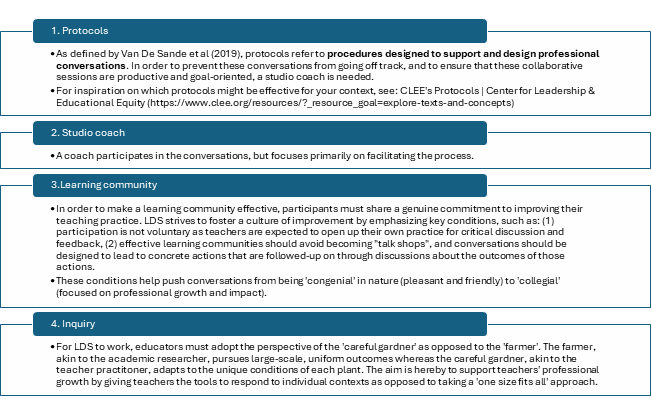Professional Learning in Higher Education – SOP Days 2025
On June 26th and 27th, Valtr Troy Mandemaker travelled to Eindhoven to attend the SOP (Studiegroep Onderwijskundige Professionalisering) days. The study group SOP, created by EHON (Expertisenetwerk Hoger Onderwijs), focuses on the didactical training of educators in the field of higher education. They gather twice a year to discuss developments and research on teacher professionalisation.
The central theme of this year’s SOP days was learning communities, and the underpinning question: how do we cultivate collective wisdom for teacher professionalisation? Various keynote lectures were given, as well as workshops on a range of topics, such as self-regulated learning, the role of technology in supporting educational communities and the practice of Learning Design Studios.
Practical tips and examples of best practices are provided below to help you launch initiatives aimed at enhancing community learning at your institution.
Learning Design Studios: a platform for professional learning in higher education
The first keynote lecture by Rutger van de Sande presented the concept of Learning Design Studios (LDS) as a way of working in which educators co-construct knowledge with peers in a structured manner, aiming to directly impact their own educational practices. The four key elementsare summarized:

Communities of Practice
Ermelina Jaku kicked off the second day with an inspiring keynote about the key characteristics of successful communities of practice; here the role of trust is highlighted as foundational. The VU Mixed Classroom Educational Model emphasizes ‘sensitising’ as a crucial first step in building any community as, through actively creating a foundation of mutual respect and psychological safety, members feel valued and empowered to participate.
Reducing anonymity is an important strategy to achieve this end, as creating a safe learning environment starts with participants knowing each other. Simple, but effective: allotting time for an introductory exercise or allowing for small group discussions, for example, can help in this step to reduce anonymity. Furthermore, promoting regular interaction and a strong sense of ownership is essential for community building, grounded in the shared practice of providing a supportive space where peers can experiment with their ideas as a “playground for exploration” and receive critical feedback.
If you are interested in building your own (online) community, LLInC offers a free self-guided training. It equips teachers, support staff and students with the tools and techniques to build, maintain and engage online communities.
Key takeaways
- Use structured protocols to guide conversations and maintain focus, while remaining flexible to specific needs.
- Avoid treating feedback as a one-time consultation; follow up by showing how the provided input has been considered and acted upon.
- To build trust within a learning community, special efforts should be made to ‘sensitise’ the group in order to create a foundation where members are willing to engage.
- Encourage regular, constructive interaction that builds trust e.g. collegial consultation/‘intervisie’. Suggested set-up:
- Frequency: 1 session per month, spread across 10 months
- Duration: 2-3 hours per session
- Participants: 4-10
Are you joining us at the next SOP days? Keep an eye out for further details regarding EHON’s future events on their website!
Interested in the topics discussed in this blog? Here are some further readings, recommended by Valtr:

